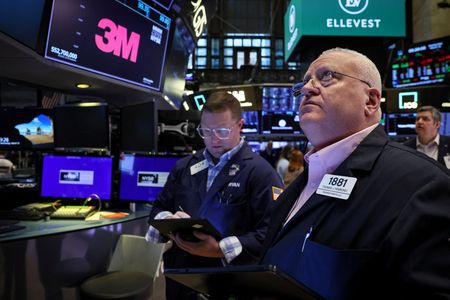By Caroline Valetkevitch
NEW YORK (Reuters) -U.S. stocks fell on Friday, led by technology-related megacaps that have propelled this year’s rally, while investors weighed the interest rate outlook ahead of next week’s Federal Reserve meeting.
Traders have reined in bets of a June rate cut by the Fed after this week’s hotter-than-expected inflation data.
Shares of Adobe dropped 13.7%, a day after it forecast second-quarter revenue below analysts’ estimates, citing competition and weak demand for its artificial intelligence-integrated photography, illustration and video.
The S&P 500 technology index was down 1.3% on the day, leading declines among sectors. Microsoft fell 2.1% and was among the biggest drags on the index.
An index of semiconductors was down 0.5% on Friday and registered its biggest weekly percentage decline since early January. The Nvidia GTC developer conference scheduled for March 18 to 21 will be watched closely for AI-related announcements.
“We seem in a period here where everyone knows rates eventually will be lowered. The expectation of when it happens keeps getting slightly pushed back, but investors still believe it will happen,” said Rick Meckler, partner at Cherry Lane Investments in New Vernon, New Jersey.
“It’s been a back-and-forth market as people reposition and consider whether some of the real winners have just gone a little bit too far, so you’re seeing them trade off.”
The Dow Jones Industrial Average fell 190.89 points, or 0.49%, to 38,714.77. The S&P 500 lost 33.39 points, or 0.65%, at 5,117.09 and the Nasdaq Composite dropped 155.36 points, or 0.96%, to 15,973.17.
Major indexes registered slight declines for the week. The Dow was down 0.02%, the S&P 500 was down 0.1% and the Nasdaq was down 0.7%.
The small-cap Russell 2000 index fell 2.1% for the week.
Friday also marked the simultaneous expiry of quarterly derivatives contracts tied to stocks, index options and futures, also known as “triple witching,” which can boost volume.
Friday’s volume was the year’s highest by far on U.S. exchanges, with 18.76 billion shares traded. The average volume for a full session over the last 20 trading days was about 12.4 billion.
The week started with investors’ options positions leaning toward call contracts – typically bought to express a bullish bias, said Brent Kochuba, founder of analytic service SpotGamma. However, the S&P 500’s failure to rise quickly eroded the value of upside call options, putting further downward pressure on the market, he noted.
While Wall Street’s AI-driven rally has stalled, the S&P 500 remains up 7.3% for the year to date.
Among data released on Friday, production at U.S. factories increased more than expected in February, but the January figure was revised sharply down as manufacturing remains hamstrung by higher interest rates.
Also, the University of Michigan’s preliminary reading on the overall index of consumer sentiment came in at 76.5 this month, versus an estimated reading of 76.9.
All eyes are now on next week’s Fed meeting and any clues on the central bank’s outlook for rate cuts.
Among other declining shares, Ulta Beauty fell 5.2% after forecasting full-year profit below Wall Street estimates, as elevated supply-chain costs and increased promotions hurt its margins.
Advancing issues outnumbered decliners on the NYSE by a 1.11-to-1 ratio; on Nasdaq, a 1.12-to-1 ratio favored advancers.
The S&P 500 posted 27 new 52-week highs and no new lows; the Nasdaq Composite recorded 53 new highs and 134 new lows.
(Reporting by Caroline Valetkevitch; additional reporting by Saqib Iqbal Ahmed in New York and Bansari Mayur Kamdar and Shashwat Chauhan in Bengaluru; Editing by Pooja Desai and Richard Chang)




